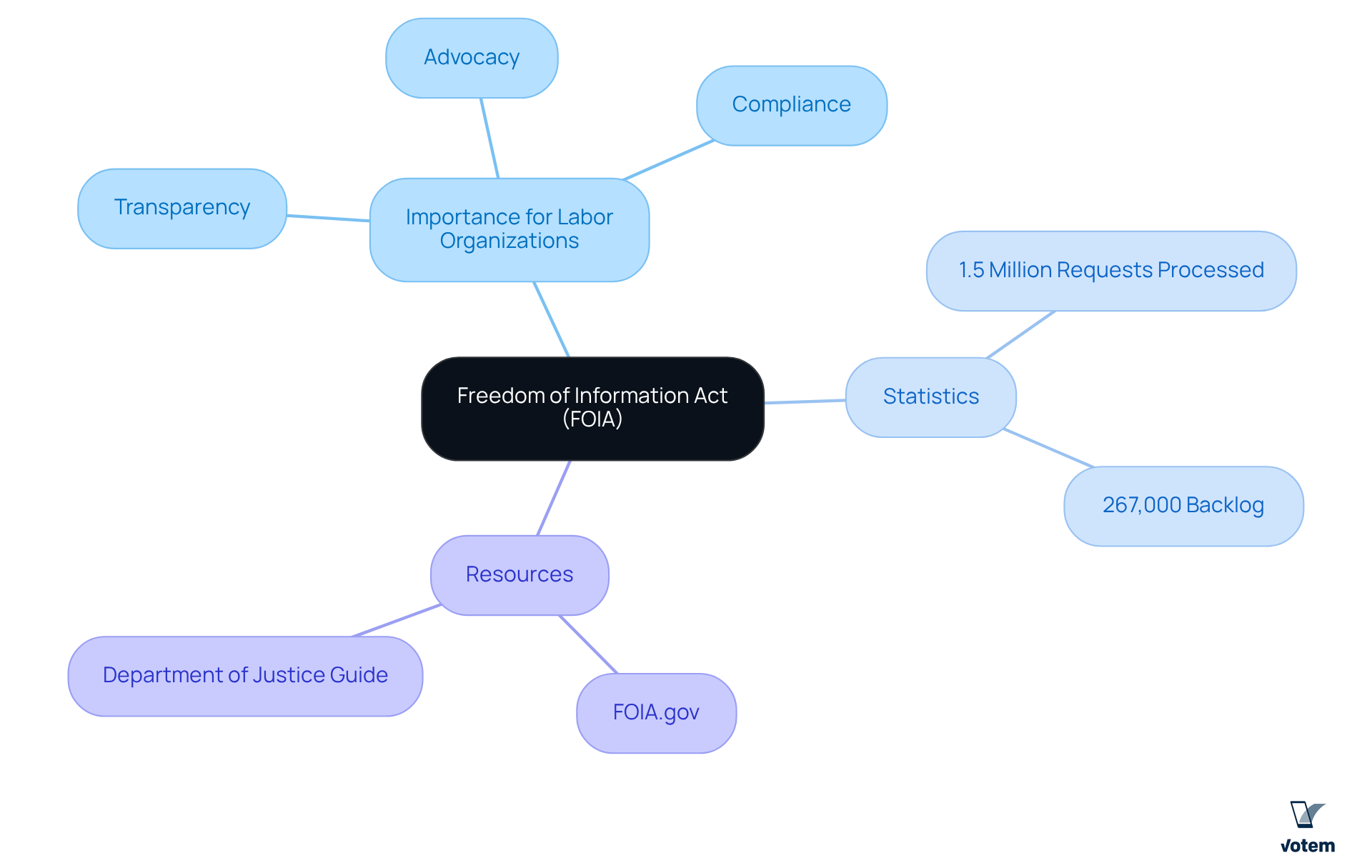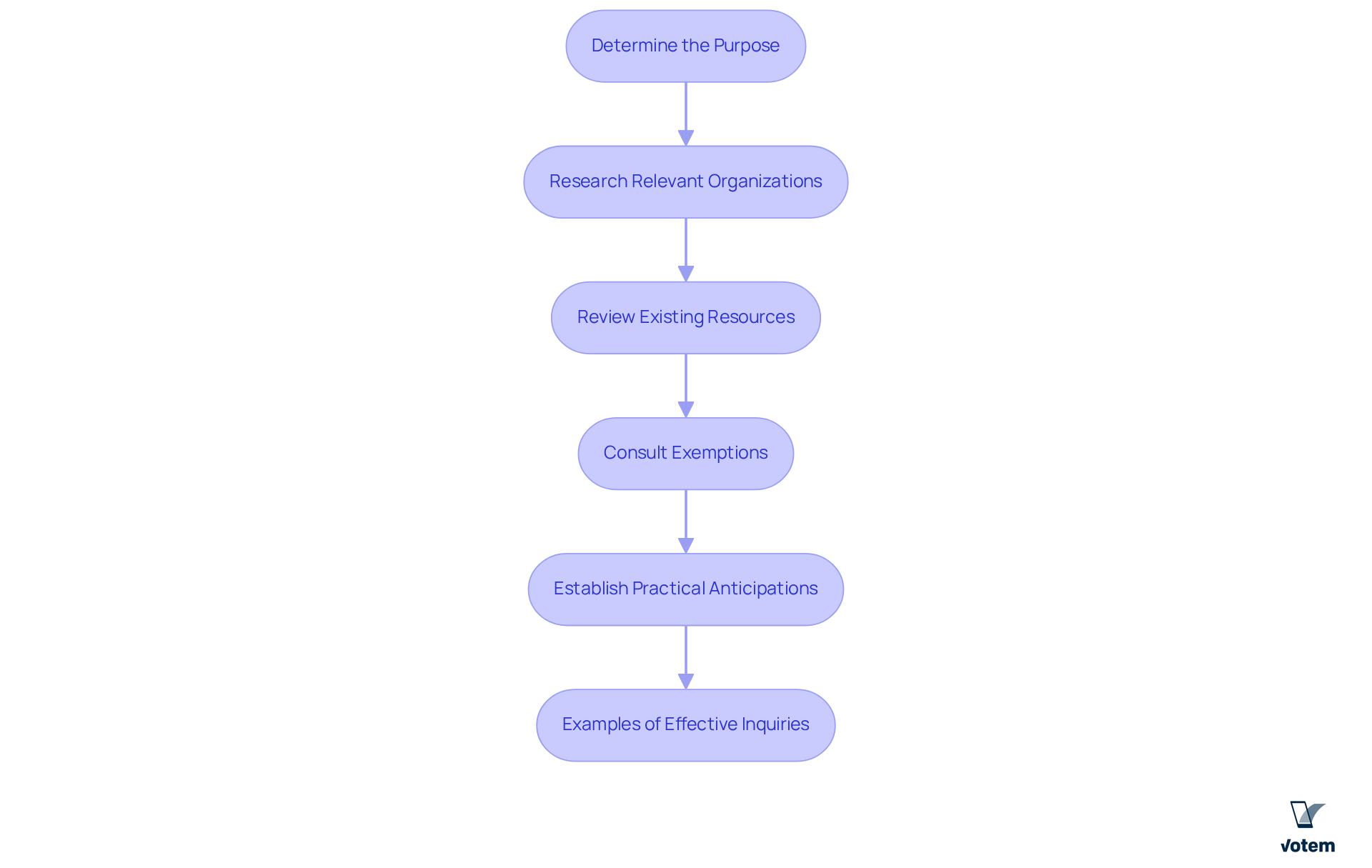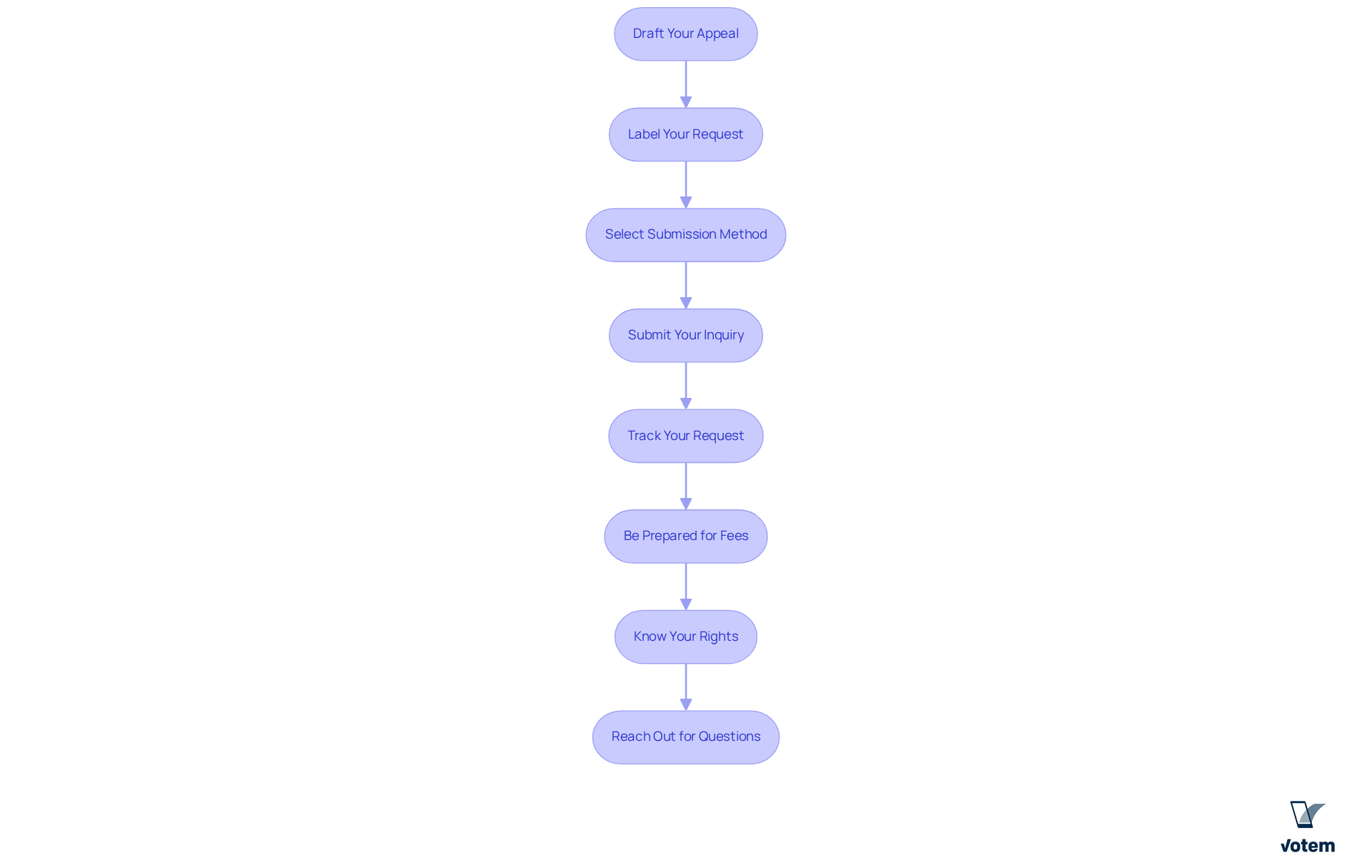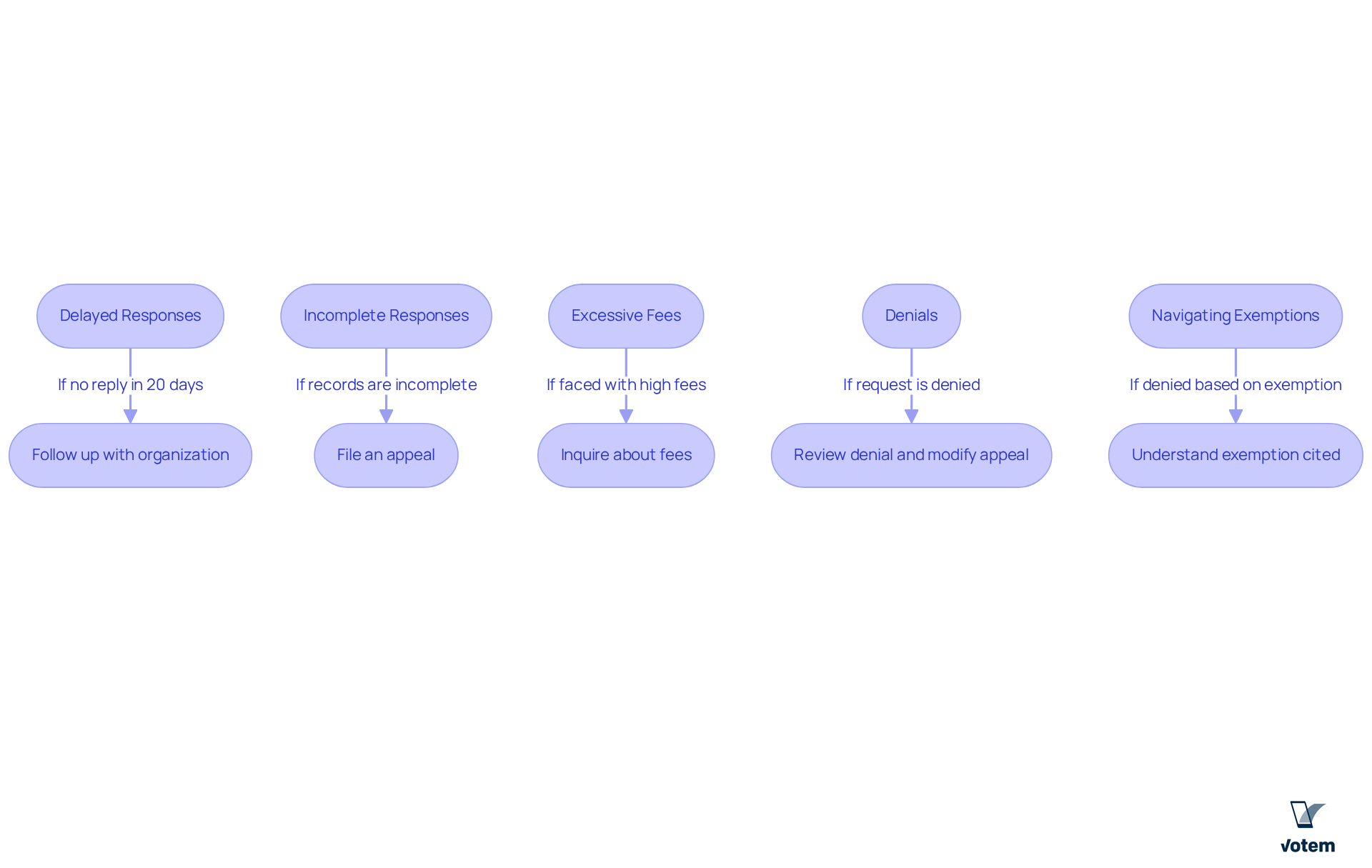Overview
This article delves into the strategic ways unions can adeptly navigate the Freedom of Information Act (FOIA) process, thereby enhancing transparency and accountability within their organizations. By outlining essential steps for submitting requests, identifying eligible records, and troubleshooting common issues, it underscores the critical importance of comprehending the act. Such understanding not only bolsters advocacy efforts but also ensures compliance with labor regulations.
Furthermore, recognizing the complexities of FOIA can empower union leadership to take decisive action. By mastering the intricacies of this legislation, unions can effectively advocate for their members while fostering a culture of openness. This article serves as a vital resource, guiding unions through the FOIA landscape to maximize their impact.
In addition, the article emphasizes the need for a proactive approach in dealing with potential challenges. By preparing for common issues, union leaders can streamline their processes and enhance their advocacy efforts. Ultimately, this knowledge will equip them to navigate the FOIA process with confidence, ensuring that their organizations remain compliant and transparent.
In conclusion, understanding the Freedom of Information Act is not just beneficial; it is essential for union leadership. By leveraging this knowledge, unions can significantly improve their operations and advocate more effectively for their members, fostering a stronger, more accountable organization.
Introduction
The Freedom of Information Act (FOIA) serves as a crucial pillar of transparency, empowering unions to access essential documents that significantly influence their advocacy and compliance efforts. As labor organizations navigate an increasingly complex landscape, it becomes imperative to understand how to effectively utilize FOIA to enhance accountability and improve working conditions.
However, with federal agencies facing a staggering backlog of requests, how can unions ensure their inquiries are not only heard but also acted upon in a timely manner? This guide delves into the intricacies of the FOIA process, offering unions the tools and strategies needed to master this essential resource.
Understand the Freedom of Information Act (FOIA)
The Freedom of Information Act represents a critical national statute that ensures freedom of information by empowering the public to request access to documents from any federal office. This act serves as a cornerstone for transparency and accountability in government operations, promoting freedom of information. For labor organizations, a thorough understanding of freedom of information is indispensable, as it provides a vital resource for obtaining information that can bolster advocacy efforts, enhance working conditions, and ensure compliance with labor regulations.
In fiscal 2024, federal agencies processed a staggering 1.5 million information requests, with a backlog of 267,000 cases. This statistic underscores the obstacles that groups face in obtaining crucial information. Labor law experts emphasize that freedom of information not only facilitates access to essential documents but also fosters a culture of transparency within labor organizations. As Gunita Singh, a lawyer at the Reporters Committee for Freedom of the Press, articulated, ‘The Freedom of Information Act is a statute that ensures the freedom of information — not just a simple recommendation, and it necessitates adherence.’ This statement highlights its pivotal role in holding employers and government entities accountable.
To adeptly navigate freedom of information, organizations should familiarize themselves with the , including the types of documents available for access and the applicable exceptions. Resources such as FOIA.gov and the Department of Justice Guide to the freedom of information offer comprehensive insights into the act’s framework and practical applications. By leveraging these resources, organizations can effectively utilize this powerful tool to enhance transparency and accountability.

Identify Eligible Records for Request
To effectively , unions must first identify the types of records they wish to obtain. Eligible records can include documents, emails, reports, and other materials created or maintained by federal agencies. Consider the following steps:
- Determine the Purpose: Clearly define the reason for your inquiry. Comprehending the purpose will assist you in crafting a precise and focused appeal. As highlighted by union leaders, “Establishing the objective of a public records inquiry is essential for guaranteeing that the information pursued aligns with the union’s goals and needs.”
- Research Relevant Organizations: Determine which federal entity maintains the records you require. Every organization has its own information office, and understanding their roles can simplify your application process.
- Review Existing Resources: Before submitting an inquiry, check if the information is already publicly available through agency websites or databases. This preliminary step can save both time and resources.
- Consult Exemptions: Familiarize yourself with the nine exclusions under the freedom of information that may restrict access to certain records, such as those related to national security or personal privacy. Comprehending these exemptions will allow you to create a more effective appeal.
- Establish Practical Anticipations: Be mindful that the typical response duration for information inquiries by federal agencies can differ greatly, frequently requiring several weeks to months. This understanding will help manage expectations regarding the timeline for receiving information.
- Examples of Effective Inquiries: Consider reviewing instances of successful FOIA inquiries made by other organizations. For example, an organization may have successfully requested payroll records to ensure transparency in compensation practices. By studying these examples, organizations can more effectively shape their own demands.
By adhering to these steps, unions can improve their likelihood of acquiring the necessary information while maneuvering through the intricacies of the information request process.

Submit Your FOIA Request: Step-by-Step Process
Submitting a FOIA request entails several essential steps designed to ensure clarity and efficiency:
- Draft Your Appeal: Start by crafting a clear and concise letter. Include your name, contact information, and a detailed description of the records you seek. Specificity is crucial to avoid unnecessary delays.
- Label your request by clearly identifying your correspondence as a ‘Freedom of Information‘ request to facilitate proper processing by the organization.
- Select the Submission Method: Most federal organizations accept inquiries via mail, email, or online forms. Always verify the specific agency’s freedom of information page for detailed guidelines on submissions.
- Submit Your Inquiry: Dispatch your inquiry to the designated Freedom of Information Act office and retain a copy for your records, ensuring you have a reference point.
- Track Your Request: After submission, monitor the status of your request. Numerous organizations offer tracking features through their FOIA portals. Should you not receive a response within the statutory timeframe, typically 20 business days, follow up with the organization.
- Be Prepared for Fees: Be aware that some agencies may impose fees for processing your inquiry. The first two hours of search time and the for all requesters. Familiarize yourself with potential costs, calculated based on the salary level of the employee conducting the search, plus 20% for benefits. Inquire about fee waivers if you qualify, as educational institutions and non-commercial entities often benefit from reduced fees or exemptions.
- Know Your Rights: If your inquiry is denied or inadequately addressed, you have the right to file an appeal within 90 days of the response letter. This ensures you have options should your appeal not meet your expectations.
- Reach Out for Questions: If you have inquiries about your submission or require assistance, contact the Requester Service Center at (202) 418-0440 for support.
By adhering to these steps, unions can effectively navigate the freedom of information request process, ensuring transparency and access to vital information while avoiding common pitfalls.

Troubleshoot Common FOIA Request Issues
Even with careful preparation, challenges can arise during the information request process. Understanding these common issues and employing effective strategies is crucial for union leadership.
- Delayed Responses: If you do not receive a reply within the required 20 business days, swiftly reach out to the organization’s information office for an update. Approach this follow-up with politeness but assertiveness; persistence can often yield results. Legal experts emphasize that ‘submitting a FOIA lawsuit can urge organizations to respond, frequently leading to faster replies and potentially recuperation of legal fees under FOIA’s fee-shifting law.’
- Incomplete Responses: Should the records provided be incomplete or not correspond with your inquiry, you have the right to file an appeal. Clearly articulate the reasons for your appeal, specifying the records you believe were omitted. This clarity can significantly strengthen your case.
- Excessive Fees: If faced with high processing fees, inquire about the rationale behind these charges and explore the possibility of a fee waiver. Requesting a detailed breakdown of costs can also help clarify any discrepancies.
- Denials: In the event of a denial, agencies must provide a justification. Carefully review this denial to understand the reasoning and consider modifying your appeal to address the concerns raised. If necessary, do not hesitate to file an appeal.
- Navigating Exemptions: If your application is denied based on a specific exemption, familiarize yourself with the exemption cited. Comprehending the reasoning behind the denial can assist in enhancing future submissions or preparing for an appeal.
Unions have increasingly faced delays in information requests, with the surpassing 200,000 as of FY 2022. This statistic underscores the growing difficulties organizations encounter in acquiring timely information. By employing these strategies, unions can effectively navigate the complexities of the FOIA process, ensuring greater transparency and accountability in their operations.

Conclusion
The Freedom of Information Act (FOIA) stands as a crucial instrument for unions, empowering them to access essential information that bolsters their advocacy and compliance initiatives. By grasping the nuances of this act, labor organizations can enhance transparency and accountability, ensuring their voices resonate and their rights remain safeguarded. Mastering the intricacies of the FOIA process significantly amplifies unions’ capabilities to navigate the complexities of information requests.
Key steps for effectively utilizing FOIA have been outlined, including:
- Identifying eligible records
- Submitting requests
- Troubleshooting common issues
The emphasis on clarity and specificity in requests, alongside an awareness of potential hurdles such as delays and denials, equips unions with the essential knowledge to optimize their information-gathering efforts. Resources and best practices shared throughout the article further illustrate how unions can fully leverage this powerful legislative tool.
In light of the challenges posed by an increasing backlog of requests and potential obstacles in the information retrieval process, it is imperative for unions to adopt a proactive stance. By embracing the guidelines articulated in this article and advocating for their rights under the FOIA, unions can cultivate a culture of transparency and accountability that not only benefits their members but also fortifies democratic processes. Ultimately, empowering unions to master the FOIA process contributes to a more informed and engaged workforce, poised to effect meaningful change.
Frequently Asked Questions
What is the Freedom of Information Act (FOIA)?
The Freedom of Information Act is a national statute that empowers the public to request access to documents from any federal office, promoting transparency and accountability in government operations.
Why is the Freedom of Information Act important for labor organizations?
It provides a vital resource for labor organizations to obtain information that can support advocacy efforts, improve working conditions, and ensure compliance with labor regulations.
How many information requests did federal agencies process in fiscal 2024?
Federal agencies processed 1.5 million information requests in fiscal 2024, with a backlog of 267,000 cases.
What does the backlog of information requests indicate?
The backlog of 267,000 cases highlights the challenges that groups face in obtaining crucial information through the Freedom of Information Act.
What do labor law experts say about the role of the Freedom of Information Act?
Labor law experts emphasize that the act not only facilitates access to essential documents but also fosters a culture of transparency within labor organizations.
What resources are available to help organizations navigate the Freedom of Information Act?
Organizations can utilize resources such as FOIA.gov and the Department of Justice Guide to the Freedom of Information for comprehensive insights into the act’s framework and practical applications.
What should organizations understand to effectively use the Freedom of Information Act?
Organizations should familiarize themselves with the key provisions of the Act, including the types of documents available for access and the applicable exceptions.
List of Sources
- Understand the Freedom of Information Act (FOIA)
- After promising transparency, RFK guts public records teams at HHS (https://npr.org/sections/shots-health-news/2025/04/03/g-s1-57888/hhs-fda-rfk-foia-public-records)
- Record number of FOIA requests filed in 2024 (https://federalnewsnetwork.com/federal-newscast/2025/04/record-number-of-foia-requests-filed-in-2024)
- United States Department of Justice 2025 Chief FOIA Officer Report (https://justice.gov/oip/united-states-department-justice-2025-chief-foia-officer-report)
- Identify Eligible Records for Request
- FOIA Update: Significant New Decisions (https://justice.gov/archives/oip/blog/foia-update-significant-new-decisions-16)
- OGIS Issue Assessment: Commonly Requested Categories of First-party Records (https://archives.gov/ogis/foia-compliance-program/targeted-assessments/first-party-records-30-aug-2021)
- Submit Your FOIA Request: Step-by-Step Process
- How to Make FOIA Requests | Homeland Security (https://dhs.gov/dhs-foia-handbook)
- How To File A FOIA Request (https://fcc.gov/reports-research/guides/how-file-foia-request)
- FOIA.gov (Freedom of Information Act) How to Make a FOIA Request (https://foia.gov/how-to.html)
- Troubleshoot Common FOIA Request Issues
- FOIA Wars: A New Hope for Beating FOIA Delays Through Litigation and Winning Attorney’s Fees – Reddy Neumann Brown PC (https://rnlawgroup.com/foia-wars-a-new-hope-for-beating-foia-delays-through-litigation-and-winning-attorneys-fees)
- FOIA Backlogs Hinder Government Transparency and Accountability (https://gao.gov/blog/foia-backlogs-hinder-government-transparency-and-accountability)
- What to do about those ever-rising FOIA request backlogs (https://federalnewsnetwork.com/agency-oversight/2024/03/what-to-do-about-those-ever-rising-foia-request-backlogs)
- FOIA requests, denials, backlogs, delays, costs surge in FY 2024 – Brechner Center for Freedom of Information (https://brechner.org/2025/04/30/foia-requests-denials-surge-fy-2024)
- FOIA Suits Rise Because Agencies Don’t Respond Even As Requesters Wait Longer To File Suit | The FOIA Project (https://foiaproject.org/2019/12/15/foia-suits-rise-because-agencies-dont-respond-even-as-requesters-wait-longer-to-file-suit)

